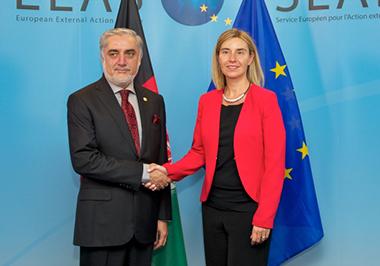Delivering the closing speech of the Brussels Summit on Wednesday, Afghan CEO Abdullah Abdullah said he was "delighted to say that the result is highly encouraging as we embark on a new phase of Afghan development and progress aimed at paving the way for long-term self-sustenance".
On behalf of every peace and progress-loving Afghan man, woman and child, he thanked all delegations, their governments and people, as well as the United National and international organizations for standing by the Afghan people.
He also thanked that European Union for its steadfast support of Afghanistan for more than 15 years.
He said the pledges, totaling $15.2 billion USD over four years, made on Wednesday were impressive and encouraging.
"They send a very clear message of hope and support to the Afghan people. At a time when many in our country worry about security threats, economic hardship, political challenges and regional uncertainty mixed with destructive meddling, this is very welcome news from our friends and allies who are also preoccupied by several other global hotspots and demands made on scarce resources."
He went on to say that on Tuesday two important side events had been held - one on women's rights and empowerment and the other on regional integration.
He said that regarding women's rights, the National Unity Government (NUG) is determined to improve women's participation in the legislative, judiciary and executive branches and donor projects will help empower thousands of Afghan women over the next decade in the public and private sectors.
However, he pointed out that government was fully sensitive to the plight of women and the challenges they face in society, especially in rural areas.
"We will do everything possible to protect women by addressing violence and high illiteracy rates."
On the second topic, regional integration, he said this is a top foreign policy objective for government.
"Projects such as CASA1000, TAPI, TUTAP, and Chabahar are examples of our commitment for regional cooperation, trust-building and prosperity," he said.
He said the formation of the Afghan National Unity Government was a landmark achievement in the country's political history.
The political accord that established the National Unity Government is our "social contract", as we are determined to uphold and implement it per our pledge to the Afghan people and the endorsement of the international community, he said.
He also said: "The end of the era of big spending and little oversight is behind us. As part of the new realities, the Afghan economy underwent major readjustments, combined with years of corrupt practices that have produced severe hardship for our people.
"If you add the security risks and terrorist threats facing our people to the mix, many Afghans have been forced to leave. We are trying, with your understanding, to mitigate this challenge, and offer better prospects to our young and educated. We will work on fair and pragmatic repatriation schemes, but we expect and are aiming for the kind of planning that can prevent migration in the first place," he said.
"While we are talking of migration, I here draw your attention to the scale of humanitarian issues faced by Afghanistan as it is both receiving returning Afghans at a scale not seen in the last decade and having to better address needs of displaced people.
"We cannot underestimate the burden this places on the Afghan economy, the brunt of which is borne by the Afghan people themselves who generously host displaced and returnees a like. I am concerned that this generosity and capacity to support should not be over extended. We need to ensure that they do not fall into poverty themselves and no longer can afford to host.
"We have to be aware of increasing levels of poverty and vulnerability of the displaced and returnees as well as the hosting communities. We must avoid a situation where vulnerable groups continue to remain in unacceptable living condition," Abdullah said.
"We welcome that EU and all others have expressed the need for a systematic approach to these issues."
In conclusion he said he and President Ashraf Ghani would be going back to Afghanistan with very good news from the Brussels Conference.
"It's not all about monetary pledges or technical assistances that are very much welcomed; It's about a journey that started 15 years ago. A long and arduous journey where many have, and continue, to pay the ultimate price, at times painful and made difficult by destructive forces, at times full of hope and inspiration; at times experiencing missed opportunities, and at times grasping opportunities.
"All in all, a journey that has yet to reach its defining moment. The journey is not only ours. Its success will be historic and will reverberate globally. We believe that it is attainable, and we very much appreciate your contributions and commitments toward making this a worthwhile journey," he said.



Comment this post